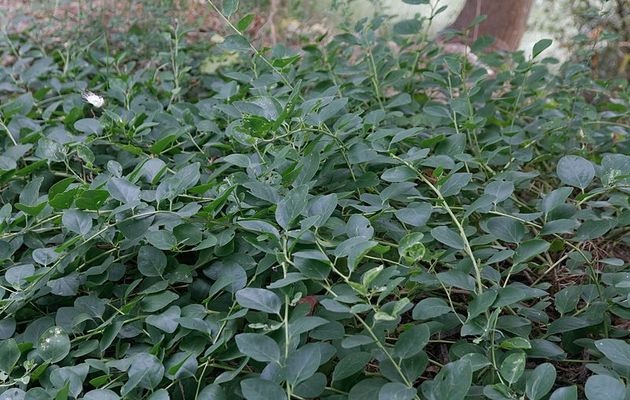Solomon’s caper-berries
The caper is native to Southeast Asia, but it is common throughout the Mediterranean basin and in many other parts of the world.
22 APRIL 2018 · 11:00 CET

Remember your Creator
in the days of your youth,
before the days of trouble come
and the years approach when you will say,
“I find no pleasure in them”
when people are afraid of heights
and of dangers in the streets;
when the almond tree blossoms
and the grasshopper drags itself along
(and desire no longer is stirred.
Then people go to their eternal home
and mourners go about the streets)
(and the caper-berry is without effect;
for man goeth to his age-long home,
and the mourners go about the streets;*)
Ec. 12:1,5
Most versions of the Bible don’t contain any reference to the term “caper-berry” (ab-ee-yo-naw). For example, in the New International Version, instead of “an the caperberry is witout effect”, we read “and desire is no longer stirred”. Nevertheless, other translators understand that the word is a metaphor used by the author of Ecclesiastes to describe old age, and that it refers to the caper bud, as this plant was used to stimulate the appetite. This point of view is corroborated by the Septuaguint, the Vulgate, the Syriac Peshitta Version and other Arabic translations.
Nevertheless, in all translations the idea is the same. The whole passage describes some of the characteristics of old age, and the fact that little or no pleasure is found in anything. It is the loss or lessening of any appetite for most of the pleasures of youth. If we understand “pleasure” to be referring to sexual intercourse, and the “caperberry” to be referring to an aphrodisiac that was common in ancient times, and familiar to king Solomon, or whoever the author of Ecclesiastes was, then we see that both ideas are present here.
What the Preacher is saying to us here is that we must take God into account especially in our youth, the period of a person’s life when they achieve their most important goals, when they take those decisions that will affect the lives of other people most significantly. But when they reach old age, their activity declines and most of the ambitions and desires that formed part of their youth start to fade away.
The caperberry (Capparis spinosa) is a plant with hanging stalks which can reach about a metre in length at the most. It is common in Israel, and usually grows in the crevices of rocks or the walls of ruined buildings, in much the same way as ivy does. Its leaves are thick and round with broad edges and held to the stalk by a short stem.
The flowers are large, some 4 to 6 centimetres in diameter, either white or pink and appear one by one at the joint between the leaves and the stalk. It has multiple stamens which are made up of long purple filaments with yellowish anthers. The pistil is also long, and its fruit fleshy. The caper berries as such are actually the plant’s unripe buds, the size of which varies from 3.5 to 4.5 centimetres in length, and they grow out of the centre of the flower on a long stem.
The caper is native to Southeast Asia, but it is common throughout the Mediterranean basin and in many other parts of the world. The buds have been used since ancient times to stimulate the appetite, and as a dressing or seasoning for food, given its numerous health benefits. It is rich in flavonoids like rutoside and quercetin, both of which are a source of antioxidants which are thought to combat cancer and skin disease. They improve blood circulation and have analgesic and anti-inflammatory, as well as antibacterial properties. They contain minerals such as iron, calcium, copper and sodium, as well as vitamins A, K and E, niacin riboflavin. They destroy certain derivatives of the fatty substances in meat that are responsible for producing cardiovascular diseases and some forms of cancer.
In the 16th century, the Florentine scholar Domenico Romoli wrote a kind of culinary encyclopaedia entitled The singular doctrine, in which, referring to capers, he said that “they enliven the coitus” [1]. And among its other benefits, he also mentions it as an analgesic for organs such as the liver or the spleen, and as a good diuretic, anti-rheumatic and anti-arthritic agent. Likewise, other reference books confirm these effects and refer explicitly to this Bible text, Ecclesiastes 12:5.
In fact, chapter 12 of Ecclesiastes appears to present a dark and bleak picture of the human condition. Solomon had had many different experiences throughout his life. Besides, he had sufficient resources to try almost everything to determine whether or not there really was true satisfaction apart from God. Wherein does true happiness lie? He tried to find an answer in nature, or in the study of what we would now call the natural sciences; in a bucolic return to a simple, natural world.
However, he realised that all this offered no solution to his existential problems. Later he also tried philosophy and knowledge, the search for every kind of pleasure, fatalistic materialism, selfishly living for the moment, religiosity without spirituality, material wealth, the practice of moral rectitude, etc.
Lastly, in this twelfth chapter, Solomon says to young people:
Remember your Creator in the days of your youth, before the days of trouble come and the years approach when you will say, “I find no pleasure in them” when people are afraid of heights and of dangers in the streets; (when the almond tree blossoms and the grasshopper drags itself along and the caper-berry is without effect; for man goes to his age-long home, and the mourners go about the streets)*
The human being must seek God while He may be found (Isaiah 55:6).
*Translation of the phrase in brackets taken from the JN Darby translation.
Published in: Evangelical Focus - Zoe - Solomon’s caper-berries
